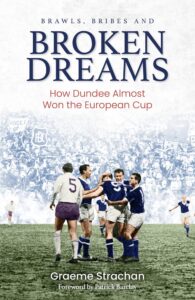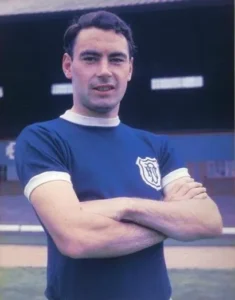Book Review – Brawls, Bribes and Broken Dreams: How Dundee Almost Won the European Cup by Graeme Strachan
 Scottish teams have a tough time in European competition. It is not just the games in which they may struggle which are challenging but also the humour plumbed when Christmas comes and the best present a fan could have, would be a European tie in January.
Scottish teams have a tough time in European competition. It is not just the games in which they may struggle which are challenging but also the humour plumbed when Christmas comes and the best present a fan could have, would be a European tie in January.
It is doubled when you might not be a supporter of either Celtic or Rangers. Celtic may have the proud boast of being the very first British team to win the European Cup and Rangers five years later managed to add the second Scottish European triumph, but the 80s brought Aberdeen and Dundee United to that Eurovision of their achievements, though only the Dons would win a cup.
Ironically, Brawls, Bribes and Broken Dreams by Graeme Strachan, which could be the subtitle for any Scottish League campaign, tells the story not of Dundee United but their near neighbours. A team which shares the same city and the same road as United, Dundee, were once, the team most people believed would win the European Cup and be the very first Scottish team to so do. It is a compelling tale.
This is the story of 1962/63 when the champions of Scotland, Dundee, took on the might of Europe. It was, of course, a simper time, when it was only the champions of each country who competed. It made it much smaller as a competition too. It was also, according to Strachan when, “young boys played football in the streets and parks of Dundee.” Those of us of a certain age can all remember then. What is less well remembered is that before there was Bill, there was Bob and Bob managed a European run before his well-considered older sibling. Bob Shankly, was the manager at Dundee who gave us, according to Bob Crampsey, “the best pure footballing team produced in Scotland since the war.” This is their story.
Strachan recaps for us the story of the run in to the title in 1962 and it does well to remember a time when Rangers or Celtic had their dominance regularly challenged. It includes a cameo appearance by a young St. Johnstone striker by the name of Ferguson, Alex, and such cameos are regular features in Strachan’s tale. So too is the humility of Shankly – having won the title, he was next seen mowing his lawn!
Strachan then outlines an interesting pre-season in the USA. Long held as a soccer/footballing desert but here the champions of Scotland get trans-Atlantic travel under their belts early. Dundee was a team, not just bound by their own, soon to be whispered, mythology but included one name from the Famous Five at Hibernian, another great Scottish side long forgotten and much missed, Gordon Smith. Despite the pedigree Dundee had, not all were convinced that Dundee would manage much abroad, and the Weekly News scathingly opined at the beginning of the season and their campaign, “European Cup? Well, all the best anyway!”
It gives Strachan a fantastic backdrop as he starts with the first round, epic encounter with Cologne. Dundee managed such a margin of victory in the first leg, that the second leg became a formality, and there was suddenly a frenzy of interest in all things European and Dundonian. Strachan draws in what was happening in the world of the time but also the city of Dundee – it is an additionally welcome backdrop. From descriptions of the city being redrawn, the civic vandalism which has been condemned not only by those with the benefit of hindsight, but of natives like Brian Cox, the actor, we hear of the heart being ripped from a city. Whilst aerodromes and bridges were being built, JFK was declaring a man would be put on the moon and Arbroath miniature railway enthusiast, Mathew Kerr was running his mini link. It was a heady time and Strachan mixes both with respect. He never seeks to diminish one nor over complicate the other.
The sixties were an obvious time of change and Dundee’s exploits were part of that hope for the future. The more pressing future was the defence of their title in Scotland and that was not going to plan – all eyes could concentrate on Europe for glory.
Following their defeat of the German champions, they then got paired with the Portuguese champions, the swashbuckling Sporting Lisbon. Having dethroned Benfica domestically, Sporting Lisbon was a formidable opponent. But there was trouble at mill with some players unhappy at the level of involvement they were having in the team and Shankly was called upon to show deft management skills. They had to be pretty acute as this was a time when there were no substitutes and squad size beyond the 11 on the pitch included another 11 in reserve who were literally playing, in the reserves. Keeping all happy was a nightmare. It was also a time when internationals happened, there was no pause for anyone to work, rest then play again. You could lose good players and still have to fulfil your usual league fixtures.
But where Strachan is at his best is describing the effect of dedication to your team from within their support. – the likes of Peter Cabrelli, son of an Italian exile and proud Dundonian fish and chip owner who played for both United and Dundee – as well as Dundee Juventus – but had Dens Park firmly in his heart and on a mural behind the frying pans. These stories make an appearance as part of the narrative and not as an academic exercise meaning we are still careering towards the next game but now have the emotions of the Dundee support in our minds.

Once the Sorting Lisbon tie was out the way, including Alan Gilzean getting his second hat-trick in the competition, things began to get serious. They were in the last eight alongside AC Milan, Dukla Prague, defending champions Benfica, Feyenoord, Stade de Reims, Galatasaray and Anderlecht. Strachan may be describing times before the dominance of Real Madrid, but we are in heady times.
Dundee was not alone in Europe as recognised by Strachan as Jock Stein’s Dunfermline Athletic and Glasgow Rangers were also deeply involved in their campaigns. But as Lawrence of Arabia was in the cinemas and the Bay of Pigs receded as a threat to global security and Dundee schoolkids got to grips with European geography, Dundee was ready to face a Quarter Final of the European Cup against Anderlecht.
It was also one of the coldest winters in living memory. People were able to walk across the frozen Tay – Alec O’Brien and Ian Smith became the very first people to walk across a frozen River Tay since 1898 – and players could have been forgiven for thinking they too could have walked on water. The build up to the two legs are described in detail including some United supporters, and players, who in a show of solidarity turned up to wish their rivals well in the next phase of their adventure. The city of Jute, Jam and Journalism was in thrall.
Anderlecht were despatched.
And then they were in a Semi-Final. Strachan’s ability to draw the detail of the games is good and as well as the crosses, the free kicks and the goals we get how at each and every stage, players were praised – especially Ian Ure – described by the BBC’s Kenneth Wolstenholme as “the greatest centre-half in the world today.” Belief was turning into expectation.
The Semi-Final was against AC Milan. A successful result would lead to Wembley where the Final was going to be held. There was a frenzy of support and confidence and people believed that the future Liverpool’s legendary manager’s older brother, Bob Shankly was the man who would get their men to a historic Final. Strachan manages to bring such enthusiasm to the page as you know, there has never been a focus on these European marauders rather than the Lisbon Lions, so you know how it ends, but you are compelled to stay long enough in the story to see if it is quite how you imagined it.
We get the build up to the games against Milan with a wide variety of views and witnesses quoted who believed that THIS Semi-Final was going to provide the eventual winners – Dundee was 50% of that contest! In a prescient tale of mudslinging football, the derby game beforehand as played in a Scottish quagmire, on a pitch that ended up more on the player’s jerseys than remained on their ground. As a platform for the greatest game of their careers in the best competition for clubs, this was not premium preparation. There were also injuries after a long season which included to Bobby Cox, Hugh Robertson and future Scotland manager, Craig Brown.
The first leg was where the tie was won – in Milan. The towering enthusiasm and the unbelievable run was not to continue much further. Dundee could have given much more had they not had a 12th man on the pitch determined to penalise them constantly whilst giving the Italians opportunity to behave as they wished. Milan had 15 free kicks granted in the first 15 minutes! The statistics continue as Tommy Gallacher in The Courier reported, “some of the referee’s decisions were ridiculous.” Condemnation came from all sides – former referees, the players themselves and supporters who had a list of grievances after the game but in the end, the first leg left a mountain for the Dundee team to climb if they wanted to make their, and by now, our dreams come true.
It was a notable return leg for Dens Park, as Milan’s players with film star looks, according to The Bard of Dundee, Michael Marra – an 11 year old schoolkid at the time – as they watched Milan Catenaccio into the Final. The 10 Dundee men who finished the second leg were far more sporting than many of their European opponents. As they trudged off it left an indelible mark on the city. It had been a season that Tottenham won the European Cup Winners Cup, Giovanni Trapattoni graced the Dens Park pitch and in Dundee, for a while, there was the hope. Such hope had been killed by a referee, perhaps, who was later banned for accepting gifts from Milan prior to the Semi-Final. It was a time of change as tactically aware coaches, like Jock Stein and Willie Waddell, then of the Pars and Killie were beginning to change the game and Dundee finished a weak defence of the league in the glow of their European brilliance. Strachan draws out the effect on a city, the supporters and the future of Scottish football. It is a compelling read and one well worth making a visit to remind yourself at some point that, times were different, and it was the hope that sustained you more than killed you.
Donald C Stewart
(Publisher: Pitch Publishing Ltd. May 2022. Hardcover: 352 pages)
Buy the book here:Brawls, Bribes and Broken Dreams